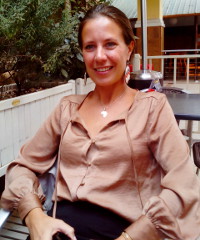Ethiopia is home to the biggest population of cattle in Africa. The leather and textile industry is central to the economy of the East African nation and has attracted millions of dollars in foreign investment. There are over 230 textile and garment factories in Ethiopia.
In 2010 Swedish entrepreneurs Madeleine Rosberg and Stephanie Persson started Responsify AB, a company that helps retailers in western markets source textile and leather products in sub-Saharan Africa.
Responsify works with factories that manufacture cotton and leather goods such as T-shirts, leggings, skirts, bags, gloves, shoes and belts. In addition to Ethiopia, the company also has a presence in Kenya, Tanzania, Uganda and Rwanda.
Rosberg believes Ethiopia is one of the markets with “great potential”.
‘Africa is hip right now’
“Ethiopia has a big population of 90m people. Adults all need work. They also have raw materials given that they have the largest population of cattle in Africa,” she says. “Other countries like Kenya and Uganda also have potential but on a smaller scale.”
The social entrepreneur says demand for African-made apparel is rising in the US and Europe, particularly when companies can show that people involved in the value chain have benefited, and no damage has been done to the environment.
“Consumers in Europe and the US are tired of the ‘Made in China’ label. It is not that attractive anymore. Lately people have opened up to African-made products because it is exotic,” says Rosberg.
“Africa is hip right now. We get a lot of requests from companies all over the world, but the problem lies on the delivery side. We need more factories here in Africa. This industry is still new in many countries and hasn’t matured yet. But we can see in Ethiopia, for instance, the amount of investments is increasing yearly.”
High potential, but challenging
Despite the opportunities in Ethiopia, Rosberg says it has been challenging working in a developing country. “Ethiopia is a complicated market to do business in. There are plenty of challenges that the government is still working on.
“Ethiopia was never colonised and so it’s quite different from other African countries that have been exposed to the rest of the world,” says Rosberg. “It is also challenging being young and a woman here. You have to be quite harsh. In Sweden you can rely on the system to work. Here there is a lot of bureaucracy. You have to be patient with everything.”
However, Rosberg notes that some of the challenges associated with doing business in Ethiopia and other parts of Africa is what makes western brands and retailers seek the services of Responsify.
“I think one of the reasons why our clients need us is the cultural gap. They want someone who understands the US and European culture, and can adapt it into the African context.”
Don’t email, visit in person
While the “relatively unexplored” nature of Ethiopia makes it harder for foreign investors and companies to do business there, Rosberg says, learning the culture can help one navigate the waters.
“You need to be entrepreneurial, be good at communication and let the process take the time it needs. I think communication is the absolute important thing. For instance, Ethiopia doesn’t have the same emailing culture that we are used to in Europe.
“Instead of sending emails you are better off texting or actually visiting an office,” she says.
“Ethiopia is also much more social. You need to take time to get to know your suppliers. You even have to get to know about their families. It took a while to learn the ropes but Ethiopia has done so much for me. It is worth the struggle.”
Back to the basics
One of the lessons she has learned doing business in Africa is that “relationships matter a lot”.
“When you do business in Africa you really go back to the basics. Things are more about personal relationships and human values. New things are constantly happening here. Every day is an adventure.”
She and her business partner Persson are also using their expertise in sustainable business models and operating in Africa to help other international companies and governments build businesses and trade relations in the continent.
“We particularly focus on sustainability issues because that is where our expertise lies. There is a lot of focus now in ensuring that companies operate ethically, people that relate with them benefit and that the environment is protected even as we exploit resources.
“We give our clients information on countries, sectors, opportunities and challenges, which help them make internal strategic moves.”
Rosberg advises foreign companies expanding to Africa to have long-term strategies and not to focus on just single countries. “Look more at regions because there are more regional synergies that can be interesting from a business perspective.
“Be strategic in your choices, have good people on the ground and be patient.”
Source: How We Made It In Africa

No comments:
Post a Comment